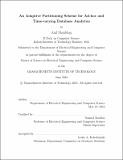| dc.contributor.advisor | Samuel Madden. | en_US |
| dc.contributor.author | Shanbhag, Anil (Anil Atmanand) | en_US |
| dc.contributor.other | Massachusetts Institute of Technology. Department of Electrical Engineering and Computer Science. | en_US |
| dc.date.accessioned | 2016-12-22T15:16:34Z | |
| dc.date.available | 2016-12-22T15:16:34Z | |
| dc.date.copyright | 2016 | en_US |
| dc.date.issued | 2016 | en_US |
| dc.identifier.uri | http://hdl.handle.net/1721.1/105961 | |
| dc.description | Thesis: S.M., Massachusetts Institute of Technology, Department of Electrical Engineering and Computer Science, 2016. | en_US |
| dc.description | This electronic version was submitted by the student author. The certified thesis is available in the Institute Archives and Special Collections. | en_US |
| dc.description | Cataloged from student-submitted PDF version of thesis. | en_US |
| dc.description | Includes bibliographical references (pages 57-59). | en_US |
| dc.description.abstract | Data partitioning significantly improves query performance in distributed database systems. A large number of techniques have been proposed to efficiently partition a dataset, often focusing on finding the best partitioning for a particular query workload. However, many modern analytic applications involve ad-hoc or exploratory analysis where users do not have a representative query workload. Furthermore, workloads change over time as businesses evolve or as analysts gain better understanding of their data. Static workload-based data partitioning techniques are therefore not suitable for such settings. In this thesis, we present Amoeba, an adaptive distributed storage system for data skipping. It does not require an upfront query workload and adapts the data partitioning according to the queries posed by users over time. We present the data structures, partitioning algorithms, and an efficient implementation on top of Apache Spark and HDFS. Our experimental results show that the Amoeba storage system provides improved query performance for ad-hoc workloads, adapts to changes in the query workloads, and converges to a steady state in case of recurring workloads. On a real world workload, Amoeba reduces the total workload runtime by 1.8x compared to Spark with data partitioned and 3.4x compared to unmodified Spark. | en_US |
| dc.description.statementofresponsibility | by Anil Shanbhag. | en_US |
| dc.format.extent | 62 pages | en_US |
| dc.language.iso | eng | en_US |
| dc.publisher | Massachusetts Institute of Technology | en_US |
| dc.rights | M.I.T. theses are protected by copyright. They may be viewed from this source for any purpose, but reproduction or distribution in any format is prohibited without written permission. See provided URL for inquiries about permission. | en_US |
| dc.rights.uri | http://dspace.mit.edu/handle/1721.1/7582 | en_US |
| dc.subject | Electrical Engineering and Computer Science. | en_US |
| dc.title | An adaptive partitioning scheme for ad-hoc and time-varying database analytics | en_US |
| dc.type | Thesis | en_US |
| dc.description.degree | S.M. | en_US |
| dc.contributor.department | Massachusetts Institute of Technology. Department of Electrical Engineering and Computer Science | en_US |
| dc.identifier.oclc | 965549381 | en_US |
